Anatomy of an Era: Mike Anderson, Part 2
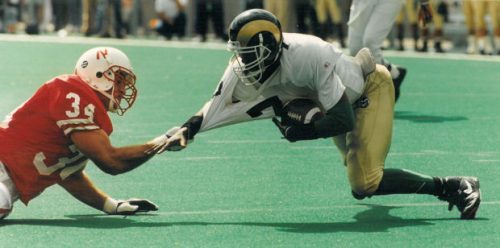
Excerpted from Chapter 88, No Place Like Nebraska: Anatomy of an Era, Vol. 2 by Paul Koch
Anatomy of an Era: Mike Anderson, Part 2
Q: So tell me, what about that game stands out? What is fresh in your mind about that game yet today?
MA: One of the things that always stands out to me is: you think when you’re gonna play in the national championship (it’s a great experience, obviously, but when you get into the game it’s just another game) the whole experience happened in just a flash. Your goal is to always play for the national championship or to win a national championship, and then when it comes it just seems like it happens so quickly. It’s just hard to take it all in, I guess, at the time. I just remember it coming and going and thinking, ‘Wow, there was our shot and we blew it. Now what?’ It was kind of any empty feeling.
Q: Do you think that gives rise to Coach Osborne’s philosophy where “It’s more the journey than the destination that matters?”
MA: Oh definitely, yeah. Because the game? It’s just a game. And in reality it’s everything up to that point and life in general that matters. It’s the path, the process versus the destination.
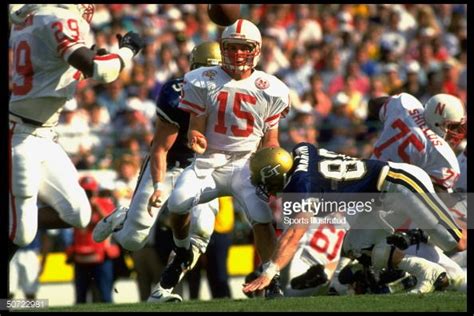
Q: The friendships and the hurdles overcome, the mental and personal challenges, as well as the group and team challenges you’ve overcome?
MA: Yeah, you’re part of a team and you’re all working together on one common goal and everybody’s excited about working for it. Then you get to that one day and it’s almost anti-climactic. If we would have won, I don’t know what it would have felt like, but I’m sure it would have felt a lot better than losing. (laughs)
Q: Do you remember the locker room after that game?
MA: Oh yeah, it was pretty quiet and some guys were crying. It was just a sad, sad deal.
Q: Any other games of note that stand out to you from your time there?
MA: Well, there’s a few that stick out: the Washington game in ’91 when they came to our house there and we were ahead by a couple touchdowns going into to the fourth quarter… and they ended up winning the national championship that year. Colorado, I think that was the same year where they tied us out in Colorado. And then I just remember the Oklahoma State game when Coach Osborne won his 200th or 250th win. I can’t remember which one, but we all wanted to win it for him. And it was a tough game. We almost lost that game. (laughs) The Kansas game that year, my senior year, where we were undefeated and they scored a touchdown right at the end of the game and they went for two, I don’t know if you remember that. I remember we screwed up on our defensive coverage and we actually double-covered the guy they threw the ball to, and there was another guy we left wide open on the other side. I mean, it was kind of one of those things where it was meant to be, how everything happened.
Q: That’s so funny…
MA: I think it was Toby Wright, he was double-covering the guy. But it worked out good. And I do remember, I was there when we lost to Iowa State… where we hadn’t lost to them in thirty years. That was kind of embarrassing.
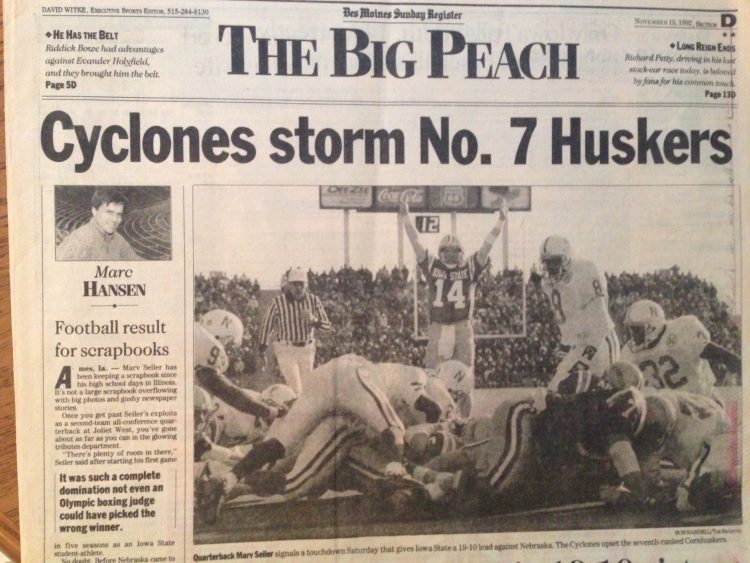
Q: Let me ask you about that. It’s often said that you learn more from your losses than your wins, which means you guys probably didn’t learn much when you where there. (laughs) But what did you guys take away from that loss to Iowa State there in ’92?
MA: You know, the thing about it is, we just came off a big win versus Kansas the week before and, if you remember that year, Colorado and Kansas were both ranked in the top ten, top fifteen, so after we won both of those games we already knew we’d won the Big 8 Championship and we only had to win one more of the next two games or so. I remember we went into that Iowa State game, it was one of those things we weren’t real worried about.
I even remember in the game, halfway through the fourth quarter and we were down, and thinking, ‘Well, we’ll win. It’s no big deal. We’re gonna come back to win.’ And then it’s less than a minute to go and you’re thinking, ‘Geez, we’re going to lose this thing.’ And it was over. It was the fastest game I ever played in my entire life. From the kickoff to the end of the game I think it was two and a half hours, something like that. I don’t think there were more than two or three passes thrown the whole game.
Q: A pretty quick deal, huh? Kind of like the Florida State game? By the time it’s over there’s a loss in the tally column?
MA: Exactly.
Q: Which reminds me of persevering and the Midwestern work ethic, where if you let a guy hang around long enough he’s going to fight back and beat you. So you just run the clock down as quickly as possible to squelch any sense of a comeback?
MA: Yeah, that was really embarrassing. I remember everybody was pretty distraught over that deal.
Q: ‘Embarrassing’ is the word you use, huh?
MA: Embarrassing. Because it was a loss to Iowa State. I remember that was back when fans would tear the goal posts down at the time. I think there were only one or two guys who had jumped on the goalpost before it snapped, it had been that long since they’d torn one down. It was that old. It was embarrassing.
Q: At least you assisted them in upgrading their facilities after that, huh? (laughs) So is there one play that stands out in your mind, one that you can still run in slow-motion and recall with ease?
MA: Yeah, I have a few like that. The Washington game, I remember Lincoln Kennedy -who went on to play in the NFL for a number of years- was their right tackle. And I remember him coming out to block me and I knocked him on his back and made a play in the backfield. That one sticks out in my mind. And when we played Colorado one year out there. I remember Darren Williams and I, we hit an ISO. And when he hit the fullback he dislocated the fullback’s shoulder and when I hit the I-back I bruised the guy’s sternum. And so we knocked both guys out of the game in one play. That kind of was the highlight of my career. (laughs)
Q: Couldn’t have happened to a better team, huh?
MA: No, It was great.

Available on Amazon.com
Q: It seems just a few years prior to that, that’s when things really kind of started to heat up in the so-called ‘rivalry’?
MA: Oh yeah, McCartney was there and they really tried to make it a big rivalry.
Q: Now, when you were a freshman was John Melton still the linebackers coach?
MA: Well, you know what happened: I was recruited by Melton, and then after I signed my scholarship that’s when he had his heart attack. So by the time I got to Nebraska, that’s when Kevin Steele became the coach. My class was the first year who had Kevin Steele as the linebacker coach.
Q: That was a bit of an eye-opener, wasn’t it?
MA: Oh yeah, they were two totally different people.
Q: Take me back. Tell me about Kevin Steele. How would you describe the man and his methods, his personality?
MA: He was real particular. And I tell you, he was probably the best X and O coach that I’ve ever been around, the best technique coach I’d ever been around. But he had a way of making you feel like you were just a turd, you know? He didn’t make you feel that great so it really caused a lot of issues, a lot of animosity among the players against him. And that’s kind of why the linebacker corps was the closest-knit group at that time on the team. He would yell at you and berate you in front of people and you never really felt like the guy was being upfront with you. You always felt like you maybe had to look over your shoulder a little bit.
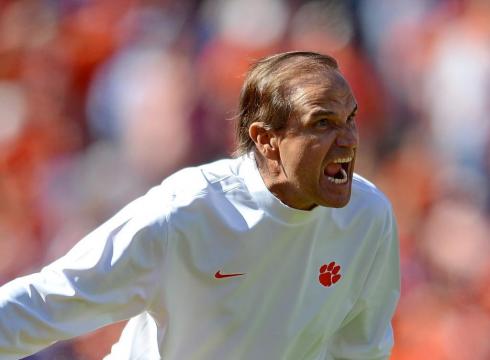
Q: I would think that was a complete fire-and-ice difference in comparison to Coach Osborne?
MA: Yeah, totally different. Yeah. I remember my senior year, it was me and Darren Williams and Troy Branch, we were all going to get our degrees in the summer and quit before our senior year because we couldn’t stand playing for Kevin Steele anymore. We had it all planned out and were gonna do that. And I don’t know how Coach Osborne found out about it, but he did. And I remember he pulled us in a room and asked us what the deal was, and we kind of explained what our feelings were. He asked if he could talk to Kevin Steele and if things would change we could stick around, and we did. And I’m glad we did, because it was the best year we ever had. He definitely changed his coaching technique a little bit that senior year and it was the best year of my whole career.
Q: Could you pinpoint any specific changes that were apparent?
MA: Well, here you’re a starter and playing a lot and you’d think that he would at least… that there would be some sort of an appreciation there for you -like you’ve got a good employee- maybe he’d treat you a little differently than a guy he doesn’t know or is not a good employee, you know? It was almost the exact opposite for him. He might have just one or two favorites and he would treat those guys like kings, and the rest of us were pretty much mincemeat. It didn’t matter how much you played or anything, he just didn’t treat you the way you wanted to be treated.
Q: Was that during the “Hey, My name is Ed, too” T-shirt deal?
MA: Actually, yeah. We made those shirts my junior year, I think it was. It was funny, because we’d watch films and he’d always say, “Hey Eddie, good job” here and “Hey Eddie, good job” there. And I remember one play (Ed Stewart) got blown back by the offensive lineman and then old Coach Steele goes, “Hey, did you read that as a pass?” and then Ed goes, “Yeah.” And he goes, “Oh yeah, I could see how you might read that as a pass.” That was pretty much the straw that broke the camel’s back. We all were like, “Hey Coach, my name is Ed, too. Treat me the same way.” So that’s how we came up with those t-shirts. (laughs)
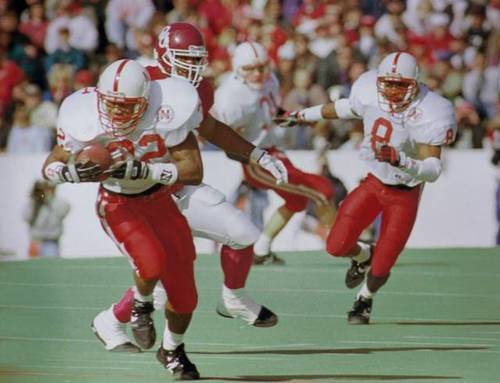
Q: I remember being in the weight room one day and four or five of you guys walked in with those gray t-shirts with a screen printed, “Hey, my name is Ed, too.”
MA: And we even walked into the whole team meeting with those shirts on! They laughed. They all knew what was going on. Steele never said one word to us about it. (laughs) Never made one comment at all. I have reached out to coach Steele recently, and he actually invited my family to a game when he was at LSU. After the game we spent an hour visiting, and he apologized for the way he coached us and really wish he could have gone back and changed, as he was young in his coaching career at the time. I really admire him for recognizing that now.
Q: He was a real piece of work, huh?
MA: Yeah. (laughs) And Charlie McBride, that guy was awesome. He was the kind of guy who’d chew your ass out and then he come around and put his arm around you and tell you he loved you and tell you “good job.” He was a great guy to be around, a great motivator. He was a fun guy.
Q: A lot of guys use the term ‘motivator’. How did Charlie motivate you?
MA: Well, he was always with the guys before every game. The defense would always go up in the big room and get a motivational talk and watch a highlight reel before the games, and Charlie would be the one who would be fire and brimstone, getting guys fired up. And even at the halftime he was the voice, the guy who motivated people. Coach Osborne, he never would really say a whole lot. He’d tell us, “You have to do this and this, whatever.” But Charlie would be the one who’d raise his voice and get pretty animated, and guys would respond to him because they knew what he was like.
Q: So it sounds like Coach Osborne was kind of the cerebral chess master while Charlie McBride was the rabble-rousing instigator?
MA: That’s probably a good definition. Yeah.
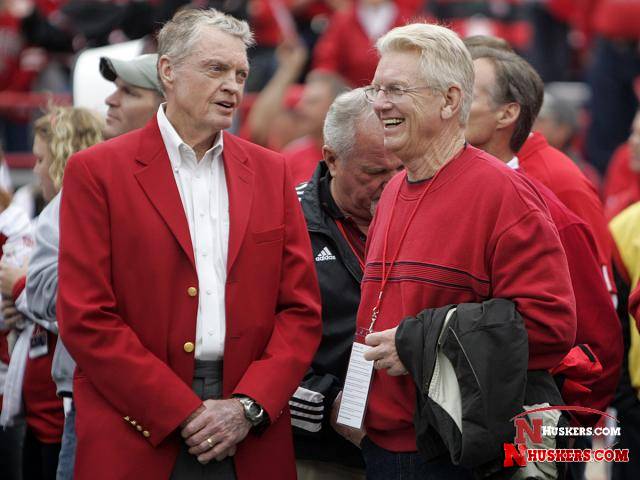
Q: Any memorable practice occasions stick out to you?
MA: Well, the one thing I remember: you never wanted people to know it was your birthday, especially around the defensive linemen. Especially Ramaekers and his big belly button. He’d take his shirt off after practice and they’d hold you down and he’d put his belly button on your face, and that wasn’t a very fun experience. The girthing, yeah. (laughs)
Q: So, obviously, you were around the time they ‘girthed’ Charlie, huh?
MA: Oh yeah, (laughs) I was there for that.
Q: Any memorable off-field experiences? Bonding experiences?
MA: You know, Troy Branch and I, we used to play racquetball together and work on our hand-eye coordination and footwork. We’ve just continued on with that and still play today.
And as far as off-field? One of the things I thought was pretty interesting… you think of Ramaekers and how he would girth guys and come up and give guys a hard time, and how guys would give him a hard time as far as being a big guy with a big belly button -you could stick a golf ball in that thing- well, he was my roommate and he was a clean freak! He would make us clean our dang apartment like two or three times a week. You wouldn’t think a guy like that would be a clean freak, but he was.
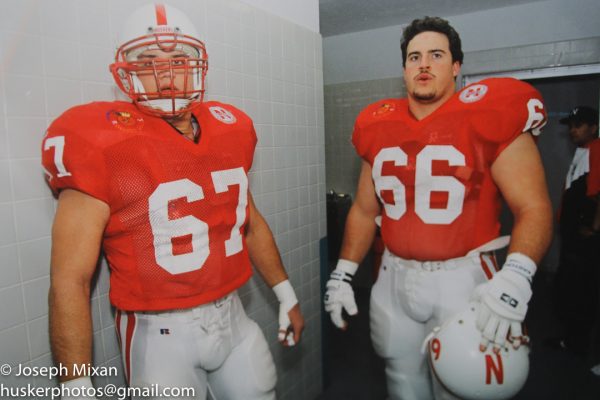
Kevin Raemakers & Brenden Stai
Q: (laughs) I just can’t see it, Mike. You’re right. I just figured he’d been a slob with underwear under the couch and mold growing under the bed on a dirty, three week-old dinner plate…
MA: Yeah, me too. (laughs)
Q: Were any other guys roommates with you?
MA: Him, I and Terris Chorney were roommates for awhile. Then I moved out of there and was roommates with Lance Lundberg -Lumpy- and we were roommates for like two and a half years. But Ramaekers? It’s hard to imagine him being a clean freak, but he was.
To be continued tomorrow….
Copyright @ 2013 Thermopylae Press. All Rights Reserved.
Photo Credits : Unknown Original Sources/Updates Welcomed
Author assumes no responsibility for interviewee errors or misstatements of fact.